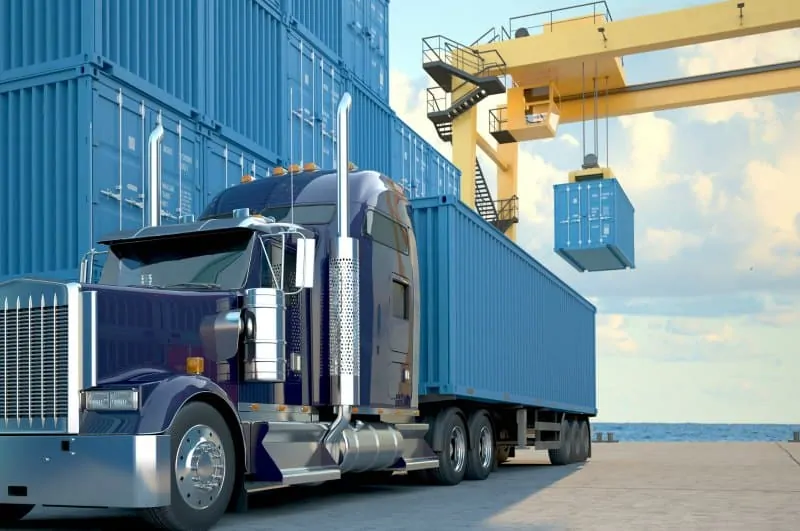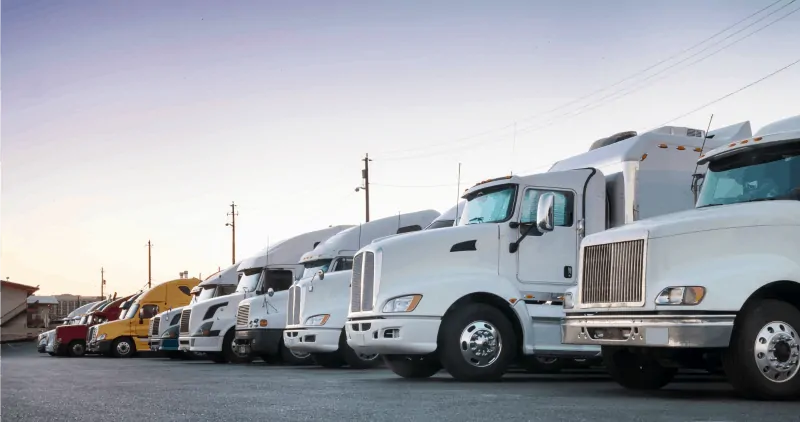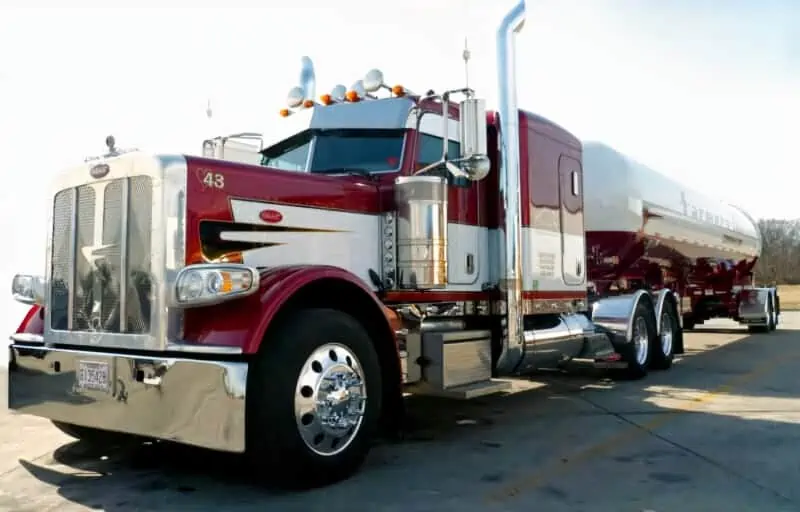The trucking industry has been facing numerous challenges in recent years, and it seems that 2023-2024 is no exception.
One of the main issues currently plaguing the industry is a significant shortage of freight.
This shortage has led to a domino effect, impacting various stakeholders within the industry, including truck drivers, trucking companies, and ultimately, American consumers.
Key Takeaways
- The 2023-2024 freight industry faces a persistent shortage which is impacting truck drivers, trucking companies and consumers.
- Increased supply chain demands and pandemic-related disruptions, make the shortage even worse.
- The ongoing freight capacity issue is affecting truck drivers’ job stability and consumer prices.

The Reasons For the Freight Shortage 2023-2024
Currently, the trucking industry is experiencing a significant freight shortage.
This shortage is impacting shippers, businesses, and countries around the world.
- Lingering effects of the pandemic. One primary factor contributing to this issue is the lingering effects of the pandemic. It has caused disruptions and imbalances in the supply chains. Many businesses are struggling to restock their inventories, leading to increased demand for freight transportation services.
- Backup in the ports. There is a great deal of backup and congestion in the ports. This has made the shortage of freight situation even worse. As a result, shipping costs have risen in some cases dramatically. Thus, many businesses have faced increased shipping costs which they are in turn passing down to consumers.
- Shortage of truck drivers. There is still the continued driver shortage in the trucking industry. The American Trucking Association has estimated that the driver shortage reached 80,000 drivers in 2021, and if trends persist, the industry could face even more significant gaps in capacity.
Overall, the freight shortage of 2023 is a result of various factors:
- including disruptions caused by the pandemic
- capacity constraints
- increasing freight rates,
- and an already existing severe driver shortage.
These challenges continue to put pressure on businesses and also consumers.
The concerning part of this is there seems to be no immediate relief in sight.
The Impact on Truck Drivers

The truck driver workforce already experiences significant on the job challenges, such as
- stress
- physical deprivation
- loneliness
- health challenges as a result of the job
These factors contribute to the difficulty in attracting new drivers and retaining drivers in the industry, contributing to the shortage of truck drivers.
As the industry faces these challenges, employment prospects for truck drivers during this freight shortage could be up and down.
While driver shortages should mean more job openings, the high demands and difficult conditions of the job tends to discourage those wishing to become a truck driver.
There’s also the question in every driver’s mind, is it still worth to be a truck driver?
The Truck Driver: A Forgotten Vital Link in the Supply
Trucking companies definitely need to step up to the plate and treat their drivers better, pay them better and go to greater lengths to ensure their drivers safety and well-being.
The trucking industry puts forth a great effort to automate trucks, with the goal in mind to replace the human truck driver.
However, human drivers play an important role in the trucking industry. Their expertise in handling complex situations on the road and ability to adapt to rapidly changing conditions are hard to replicate through AI or automated systems.
The impact of the freight shortage in 2023 will undoubtedly put more pressure on the truck driver workforce.
The importance of truck drivers in the industry and their unique skills should not be underestimated.
The Impact On Trucking Companies

The freight shortages present a significant challenge to trucking companies, especially in their profit margins.
These companies are not only struggling with securing sufficient freight to ship, but they are also facing factors such as capacity constraints and fluctuating demand in the freight market.
The decrease in sales and volume directly affects trucking companies’ margins. In order to remain competitive, they may need to re-think their strategies and adapt to the changes in the business environment.
One of the consequences of the freight shortage is a shift in consumer spending patterns. This shift has had an effect on the types of goods being transported and where these goods are being shipped to.
Carriers are also dealing with labour and part shortages. This puts companies in a difficult position when trying to keep their fleets running and on the road, to service customers.
These shortages can lead to an increase in maintenance costs and operational challenges, further impacting already thin profit margins.

Will Truck Drivers Lose Their Jobs?
As for the question of whether truck drivers will lose their jobs, the impact is yet to be seen.
While businesses might be facing difficulties, the driver shortage also continues to be an issue. If anything, trucking companies might need to explore methods for retaining and attracting drivers, like offering more competitive benefits and salaries, despite the economic headwinds.
In conclusion, the freight shortage in 2023 poses a major challenge to trucking companies.
With unpredictable sales, margins, and freight volume, adapting to the new business landscape is key for success, while also addressing labour and part shortages.
In terms of truck driving jobs, it seems unlikely that drivers will lose their positions due to the freight shortage.
While it’s true that some small carriers may be forced to close their doors, the demand for truck drivers remains an ongoing concern.
The Consequences for U.S. Consumers
Parts and labour shortages brought on by the shortfall could slow down production and delivery of vital goods across the country.
- Consumers may spend less and settle for substitute products.
- Prices of goods will continue to rise, as the shipping costs continue to rise.

When Will the Freight Shortage End?
The freight industry has experienced significant challenges in recent years, mostly due to the global pandemic.
During the height of the COVID-19 pandemic in 2022, there was a sharp decline in demand for freight services as borders closed and international trade was disrupted. The effects of this downturn were still being felt in 2023, with a slow recovery observed in March.
What will happen in 2024 is yet to be seen.
The world’s economic environment has since started to stabilize, but with excess capacity and a continuing lack of demand, the freight sector still faces challenges.
There has been a shift in the freight cycle, with no peak season forecasted in 2023 due to the excess capacity and low demand in the industry.
This has caused container spot rates to remain stagnant, with no end to the freight shortage in the immediate future.
The market conditions of September 2022 may have presented a unique opportunity for industry progress, but unfortunately, the challenges brought on by COVID-19 persisted.
With international trade returning to pre-pandemic levels, an end to the freight shortage seems likely. However, experts predict it may take longer than originally anticipated.
In light of the uncertain outlook for the freight industry, there is some concern about the job security of truck drivers.
However, as the world continues to adapt and recover from the COVID-19 pandemic, there will likely be a resurgence in demand for freight movement, which will inevitably require skilled and experienced truck drivers to support the industry’s recovery.
U.S. Trucking Industry Predictions For 2024
In 2023, the U.S. trucking industry is facing some changes related to freight movement and the job market.
As the market evolves in the second half of 2023, indications show that there could be a phase transition, with impacts on for-hire carrier operating authority and BLS trucking jobs.
This implies that truckers may have to adapt to new regulations and work conditions, but it doesn’t necessarily mean they will lose their jobs.
Huge trucking companies and smaller size carriers may both face some headwinds in 2024.
An economic recession is seen as a high likelihood for this time period, based on Commercial Carrier Journal report.
However, the trucking is expected to weather the storm and may still experience gains in spite of the lower demand and economic challenges.
So yes, there could be concerns and risks for truck drivers and trucking companies this year, but the outlook isn’t entirely bleak.
The key is for the trucking industry to stay flexible.
We need to ride this wave in trucking while things level out in the industry.
Frequently Asked Questions
Why is the trucking business slow in 2024?
The trucking business has been slow in 2023 – 2024 due to several factors which includes ongoing supply chain disruptions along with an unstable economic environment. Reduced freight demand has also led to a freight downturn causing things to slow down in trucking.
How is fleet management affected by the freight shortage?
Fleet management has been significantly affected by the freight shortage. It has forced carriers to adapt and streamline their operations to maintain efficiency and profitability, while attempting to use fewer resources and address supply chain issues.
What’s going on with truck driver shortage in 2024?
With fewer long-haul trucking jobs in 2024 and a general lowering of truckload volume growth, there continues to be a growing shortage of truck drivers. The reduction of trucking jobs is adding to this issue and causing concern for the future of the industry.
What factors are causing the trucking industry to slow down?
There are several factors slowing down the trucking industry, including supply chain disruptions, economic instability, and a reduction in the number and availability of truck driving jobs. Freight demand has also decreased, contributing to the overall slowdown in the industry this year.
How do LTL freight rates look in 2024?
In 2024, LTL (Less-than-Truckload) freight rates have experienced fluctuations due to changes in market conditions and supply chain disruptions. LTL rates have been indirectly affected by the overall trends in the trucking industry.
Will Truck Drivers Lose Their Truck Driving Jobs?
It is difficult to predict the exact outcome, but it’s clear there have been fewer long-haul trucking jobs available in the first few months of 2024.
However, increased demand for localized trucking and changes in operations may lead to the availability of different types of truck driving jobs in the future. Essentially, truck drivers may need to adapt and explore new opportunities within a changing trucking industry.





